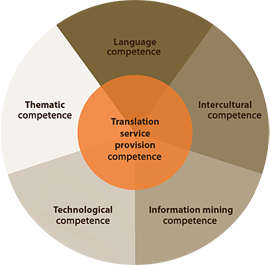- Home
- Translators Associations
- NAATI
NAATI
Professional certification from NAATI for translators & interpreters in Australia
NAATI is the only agency in Australia which issues certification for translators and interpreters working in Australia.
Certification is an indicator of professionalism and increasingly important if you want to stand out as a German translation professional in Australia's freelance marketplace.
How can I get certified?
There are several ways of getting certified if you're a German translator:

- Certification tests
- Taking approved Australian translation/interpreting courses to gain endorsed qualifications
- Overseas tertiary qualifications in translation/interpreting
- Membership of a recognised professional translating/interpreting association
- Advanced standing in the translation profession
Let's look at them in a bit more detail:
1. Certification tests
Testing is offered for the following levels of certification in the German – English combination:
- Professional Translator
- Advanced Translator
- Paraprofessional Interpreter
- Professional Interpreter
Professional Translator: This qualification shows the candidate has reached the minimum level of competence for professional translating. Candidates have to translate 3 passages of approx. 250 words and are also questioned on the ethics of the profession.
Advanced Translator: The candidate will usually already hold the Professional Translator qualification. Candidates have 8 hours to translate 3 passages, each approx. 400 words in length.
Paraprofessional interpreter: Candidates only require proficiency in German and English, and the test takes around 40 minutes for the spoken part, 1 ½ hours for the written section.
Professional interpreter: Candidates are often already paraprofessional interpreters. The test usually takes around 75-90 minutes and involves dialogue interpreting, questions of professional ethics, sight translation and consecutive interpreting.
All candidates need to provide proof of Australian residency and eligibility to sit the test.
There are 2 test sessions per year – March and September – and some examination centres abroad are available (none in the US).
All German translation test materials will conform to the new German orthography rules (Neue Deutsche Rechtsschreibung) which have been valid since 2006.
Standard reference guide is DUDEN, Die Deutsche Rechtschreibung.
NAATI recognises variations in the German spoken in Austria, Germany and Switzerland: candidates must specify the variety they will use, and will be marked accordingly.
2. NAATI approved courses for endorsed qualifications
The authority endorses a variety of qualifications in both the VET –
Vocational Education Training, and HE – Higher Education sectors.
As the Naati website states:
"NAATI Endorsed Qualifications are tertiary translation and interpreting qualifications (diploma-level or higher) conducted by VET and Higher Education institutions that have been acknowledged by NAATI as teaching and assessing the skills and knowledge required by the translating and interpreting profession.
Where a qualification at an educational institution holds NAATI
endorsement, students who complete the qualification at the standard
required by NAATI may apply to sit a certification test. NAATI
endorsement acts as a quality seal that gives credibility to an
institution's qualification(s) as well as providing a valuable incentive
to future students. "
Institutions in Australian offering endorsed qualifications for German translation:
- University of New South Wales: MA in Interpreting and Translation Studies
- RMIT University, Victoria: Advanced Diploma of Interpreting
- RMIT University, Victoria: Advanced Diploma of Translating
- Monash University, Victoria: Master of Interpreting and Translation Studies
- Monash University, Victoria: Graduate Diploma in Translation Studies
TIP! I've listed all Australian universities offering programmes in German and translation in my online directory of global translation courses: check out the page for Australia.
3. Overseas qualifications
Candidates seeking membership must first apply and then have their overseas qualifications assessed.
Overseas qualifications must be:
- Awarded by a recognised tertiary educational institute (i.e. university)
- BA or higher degree
- Adequately specialised in translation or interpreting
Where candidates qualified more than 3 years before applying for NAATI membership, then they must also demonstrate practical German translation experience.
4. Membership of a professional association
Professional translator:
This qualification is awarded to Members
or Fellows of the Chartered Institute of Linguists (UK) who can
demonstrate membership and hold the Institute’s Diploma in Translation.
Advanced Translator (senior) and Conference Interpreter (senior):
These qualifications are awarded on the basis of membership of a recognised professional association overseas, e.g the AITC, or AIIC. Accreditation is reserved for candidates active at the highest level of the profession.
5. Membership based on advanced standing
Membership can also be awarded to candidates active at the highest level of the professions, and is based on their qualifications and activities.
It is not an honorary award.
Benefits of NAATI certification
Apart from marking you out as a professional service provider, you get the benefit of being listed on their:
Translator & Interpreter directory:
The website hosts an online
directory of accredited German
translators and interpreters throughout Australia. This gives you potential client access and allows
your credentials to be checked. A typical WIN-WIN situation.
When I last
looked (2019), 94 translators and 22 interpreters were registered in
the German-English combination.
Professional development:
The organisation offers an online course on its code of ethics, and an
Introduction to Interpreting course. Workshops offer training on working
with interpreters, and professional development courses are run
occasionally.
For more information, check out the Naati website.
If you're working as a translator or interpreter in Australia, you'll also want to be a member of AUSIT, the Australian Institute of Interpreters and Translators. It has branches nationwide and organises regular member events for networking, CPD, etc.
- Home
- Translators Associations
- NAATI

Joanna Scudamore-Trezek
I'm a German to English translator living and working in Vienna, Austria. I turn German texts into clear and accessible English, allowing clients to present their stories, ideas and information to a completely new audience. My business and marketing clients rely on me to get their message across clearly and effectively. How can I help you today?













